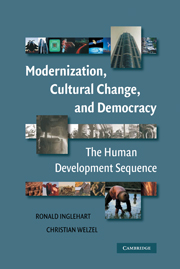Book contents
- Frontmatter
- Contents
- Dedication
- Acknowledgments
- Foreword by Hans-Dieter Klingemann
- Introduction
- PART I THE FORCES SHAPING VALUE CHANGE
- 1 A Revised Theory of Modernization
- 2 Value Change and the Persistence of Cultural Traditions
- 3 Exploring the Unknown: Predicting Mass Responses
- 4 Intergenerational Value Change
- 5 Value Changes over Time
- 6 Individualism, Self-Expression Values, and Civic Virtues
- PART II THE CONSEQUENCES OF VALUE CHANGE
- Conclusion: An Emancipative Theory of Democracy
- Bibliography
- Index
3 - Exploring the Unknown: Predicting Mass Responses
Published online by Cambridge University Press: 05 September 2012
- Frontmatter
- Contents
- Dedication
- Acknowledgments
- Foreword by Hans-Dieter Klingemann
- Introduction
- PART I THE FORCES SHAPING VALUE CHANGE
- 1 A Revised Theory of Modernization
- 2 Value Change and the Persistence of Cultural Traditions
- 3 Exploring the Unknown: Predicting Mass Responses
- 4 Intergenerational Value Change
- 5 Value Changes over Time
- 6 Individualism, Self-Expression Values, and Civic Virtues
- PART II THE CONSEQUENCES OF VALUE CHANGE
- Conclusion: An Emancipative Theory of Democracy
- Bibliography
- Index
Summary
In the previous chapter, we claimed that cultural change is predictable, insofar as it is shaped by the factors in our cultural modernization model. But cultural change is also affected by other factors such as war, nation-specific events, and a society's political parties and leaders, so any predictions based on modernization theory alone will not be precisely accurate. Nevertheless, in this chapter we predict the locations on the two main cultural dimensions of all countries that are reasonably likely to be included in the next wave of the Values Surveys, in 2005–6. Using a simple predictive model based on our revised version of modernization theory, we first “predict” and test the positions that 80 societies should have on our two major dimensions of cross-cultural variation in the most recent wave of surveys (carried out in 1999–2001). We then use this same model to predict the basic values that we expect to find among the publics of more than 120 countries that are likely to be surveyed in the next wave of surveys, in 2005–6. More than 40 of these countries have not been included in previous waves of the Values Surveys, and some of them have never been explored in any survey of which we are aware.
Prediction is an important challenge for social scientists. Social science rarely makes genuine blind predictions and then tests its theories against them. It generally advances hypotheses and tests them against data already on hand.
- Type
- Chapter
- Information
- Modernization, Cultural Change, and DemocracyThe Human Development Sequence, pp. 77 - 93Publisher: Cambridge University PressPrint publication year: 2005



